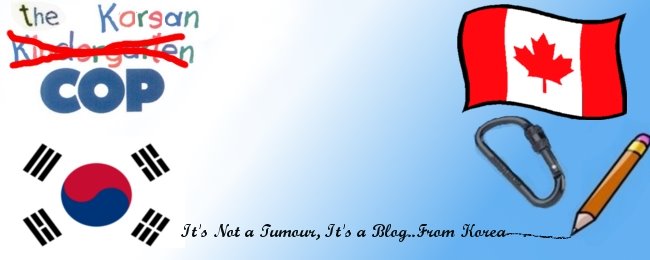I've been pretty busy this last week, so I'm a little behind. Fortunately, nothing overly noteworthy happened on the weekend, so it should be easy to catch up.
Many of the kindergartens in Seoul (and possibly Korea) were closed Monday, Tuesday and Wednesday because of the H1N1 scare. I was just now going to say that Canadians schools didn't close, but a quick Internet search revealed a report about one (just one) Burnaby school shutting down for a week.
I was going to write about my boring day off, in which I went to register as an Alien, but was told I went to the wrong office and would have to try again another day. However, instead I will use this part of the post to shed light on a popular, but unjustified fear amongst Koreans.
I really do wish I had a dollar for every time I've been told to "be careful" about the H1N1 virus from my Korean friends. Without too much exageration I could probably just about take a day off from work and be financially unaffected. When I ask my friends why they're so worried about the H1N1 virus though, I invariably get an answer along the lines of "there are many people in Korea so we have to be scared."
I suppose the reasoning is that because Korea has many people in a small area, the chance of coming in contact with the virus is greater than in, say, Canada. However, according to a recent report by South Korean health authorities, as of Nov. 4 only 45 people (in a country of over 48 million people) have died because of the virus. Compare that to the Public Health Agency of Canada's Nov. 5th totals of 115 deaths. So, really, you have nothing to worry about Koreans, 45 deaths out of 48 million people isn't that big of a deal. There are already about 3 billion too many people in the world as it is.
* * * * *
On Thursday my school had a "World Costume Festival," which basically involved dressing all the six year olds in costumes and holding a mock fashion show. If anything, like most events for children, it was just a lot of extra work for the teachers who had to constantly change the children in and out of costumes three times per class, and an opportunity to show off for parents, but at least there were some cute pictures. Here are some of the highlights:
(I like how the "Spanish" boy here is playing a ukelele.)
(This "Egyptian" looks really happy to be wearing a dress.)
(This girl can't speak English, so she often tries to communicate with me by means of her own made up language that sounds like a cross between a dog barking and a cat meowing.)
* * * * *
Last week at MEC (the English club), I learned that or leader, Tom, was gone on a trip. No one had any idea when he would be back, so I was asked to prepare the reading topics for the next week in case he was unable to prepare them upon his return.
I had originally planned to search for some interesting Korean articles - like Tom had been choosing so far - but I had difficulty searching for something about which I had no clue. Instead, I decided to fall back on what I knew: Canada.
Many Koreans think Canada is a land of milk and honey, and while I don't want to give them the impression that Canada is not one of the nicer places to live (because it is), it is far from perfect. So, I chose two articles that I found to highlight two troubling aspects of life in Canada in an attempt to broaden the perspectives and open the minds of those in attendance.
The first article I chose was about the Davis Inlet Innu nightmare. Of course it's sad that people are living in third world conditions in an OECD country, but worse yet that the government (and by extension the rest of Canada, including myself) does not really care one bit about the plight of these and any other Aboriginal Canadians (is that the PC term these days?). Koreans are constantly trying to apologise to me for racism, but they were appalled to see how equally racist (or should I say "classist?") Canadians really are. (Watch this excellent feature on the Innu from the CBC archives page for more on this tragedy - video 5, "I'll Never Stop Sniffing Gas.")
The second article I chose was called Canada's Shame. It is about the 42% of Canadians who are semi- and functionally illiterate. My Korean friends were again amazed at this statistic, since they consider the literacy rate in Korea to be 100% and reasonably expected the same of Canada. Much like the Innu story, this article also led to an interesting discussion about our failing education system in Canada. My favourite question being one I've been asking myself for a long time: "If one teacher is better than another teacher, does that teacher get more money?" Of course not, are you crazy? Why would we want to do that?












No comments:
Post a Comment